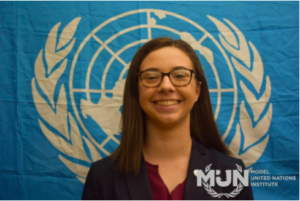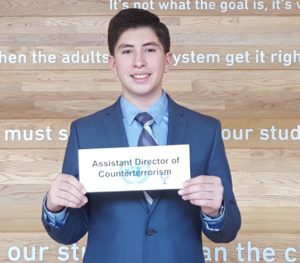The college application process is an incredibly stressful time for most high school students. Beyond SAT scores and grade point averages, many students worry about questions such as, “What extracurricular activities will impress the admissions office?” or “What can I write about in my college application essays?”
As a current high school senior, Model United Nations was a huge component of my college applications. Here are some of the ways MUN helped me through many of the factors of applying to college.
1. The College Essay
 For most competitive universities, a personal essay is a required portion of an application. For any student, this can be a daunting task. You will think, “How can I sum up my personality in 750 words?” In my Common Application essay, I discussed how MUN helped me find my voice, as well as how it influenced my passions and career aspirations. However, you do not have to be an international relations major in order to use MUN in your college essays. MUN offers unique experiences in research, public speaking, collaboration, and leadership that are applicable to nearly every field. Are you a prospective public health major? Write your essay about an interesting topic you debated in the World Health Organization (WHO) at your last conference! Are you drawn to economics? Write about your experience addressing the Eurozone debt crisis in the Economic and Financial (ECOFIN) Committee! Regardless of what you would like to study in college, writing about MUN in your essays demonstrates your abilities to research urgent global issues, convey your ideas to others, and work with your peers to develop meaningful solutions.
For most competitive universities, a personal essay is a required portion of an application. For any student, this can be a daunting task. You will think, “How can I sum up my personality in 750 words?” In my Common Application essay, I discussed how MUN helped me find my voice, as well as how it influenced my passions and career aspirations. However, you do not have to be an international relations major in order to use MUN in your college essays. MUN offers unique experiences in research, public speaking, collaboration, and leadership that are applicable to nearly every field. Are you a prospective public health major? Write your essay about an interesting topic you debated in the World Health Organization (WHO) at your last conference! Are you drawn to economics? Write about your experience addressing the Eurozone debt crisis in the Economic and Financial (ECOFIN) Committee! Regardless of what you would like to study in college, writing about MUN in your essays demonstrates your abilities to research urgent global issues, convey your ideas to others, and work with your peers to develop meaningful solutions.
2. Leadership and extracurricular involvement
 Grades and standardized testing are important factors of a college application, but competitive universities look for students who succeed beyond the classroom, as well. MUN allows students to take on leadership roles and experiences that will absolutely stand out in a college application. Whether you have organized your own conference, won numerous prestigious committee awards, or led a bloc of nations to create world peace at a nationwide MUN conference, chances are your involvement in MUN has provided you with incredible experiences to highlight in your application. Additionally, involvement in MUN demonstrates that you are a globally-minded individual with an awareness of global issues and politics.
Grades and standardized testing are important factors of a college application, but competitive universities look for students who succeed beyond the classroom, as well. MUN allows students to take on leadership roles and experiences that will absolutely stand out in a college application. Whether you have organized your own conference, won numerous prestigious committee awards, or led a bloc of nations to create world peace at a nationwide MUN conference, chances are your involvement in MUN has provided you with incredible experiences to highlight in your application. Additionally, involvement in MUN demonstrates that you are a globally-minded individual with an awareness of global issues and politics.
3. Confidence in your college interviews
Some colleges require a college interview as a part of the review process, but not all schools conduct interviews. Personally, attending my first college interview was one of the most nerve-wracking parts of the entire application process. However, I quickly realized that the interview was not bad at all—in fact, it allowed me to highlight aspects of my personality and application that cannot be expressed in statistics or school transcripts. Through my MUN experiences, I gained confidence in public speaking and communicating effectively with others, and this definitely helped in my college interviews. Not only did I discuss how MUN influenced my own goals, but I was also able to articulate my passion about global issues and human rights.
Overall, the most important part of your college application is creating a picture of how your past experiences have influenced both current passions and future goals. Being involved in MUN can offer a myriad of meaningful, unique experiences that can help you craft your applications.
Want to learn even more about how MUN can help you get into college? Download our free ebook!













 The lessons and activities at MUNI were fun, educational, and memorable. Through impromptu speaking exercises, mini-debates, and conference simulations, I developed skills and confidence as a MUN delegate. During one of my favorite activities, delegates were each given three random words, and they had to deliver an impromptu speech related to the crisis topic, ISIS in Libya. At first, the task was intimidating, but it helped me gain confidence in impromptu public speaking….it was fun, as well! All of the lessons I learned at MUNI allowed me to grow as a delegate, and this aspect of the program made the experience truly influential.
The lessons and activities at MUNI were fun, educational, and memorable. Through impromptu speaking exercises, mini-debates, and conference simulations, I developed skills and confidence as a MUN delegate. During one of my favorite activities, delegates were each given three random words, and they had to deliver an impromptu speech related to the crisis topic, ISIS in Libya. At first, the task was intimidating, but it helped me gain confidence in impromptu public speaking….it was fun, as well! All of the lessons I learned at MUNI allowed me to grow as a delegate, and this aspect of the program made the experience truly influential.









 This article was written by Best Delegate co-founder Ryan Villanueva. It is reproduced here from the Best Delegate website.
This article was written by Best Delegate co-founder Ryan Villanueva. It is reproduced here from the Best Delegate website.


 My name is Rose Jacobs, and it is my pleasure to serve as the Editor of Best Delegate’s MUNI Alumni Media Team for the 2017-18 year. Best Delegate, and my time as both camper and staff at the MUN Institute in particular, played an important role in my growth as both a delegate and a person, and I’m excited have an opportunity to share this passion with the rest of the MUN community. The diverse, enthusiastic, and incredible group of Media Associates working on the MUNI Alumni Team feel the same way — we are all looking forward to an amazing year of articles, listicles, quizzes, videos, webinars, and so much more as we share our love of the MUN Institute with the rest of the Best Delegate family!
My name is Rose Jacobs, and it is my pleasure to serve as the Editor of Best Delegate’s MUNI Alumni Media Team for the 2017-18 year. Best Delegate, and my time as both camper and staff at the MUN Institute in particular, played an important role in my growth as both a delegate and a person, and I’m excited have an opportunity to share this passion with the rest of the MUN community. The diverse, enthusiastic, and incredible group of Media Associates working on the MUNI Alumni Team feel the same way — we are all looking forward to an amazing year of articles, listicles, quizzes, videos, webinars, and so much more as we share our love of the MUN Institute with the rest of the Best Delegate family! High School. She joined her school’s Model UN club in the winter of her freshman year, and over the past year, she has grown a passion for Model UN. She followed this passion through her freshman year by attending the UMASS conference and Westwood Crisis Conference, as well as attending the MUNI Ambassadors session at Harvard University over the summer. Recently, she was given opportunity to be the vice president of her school’s Model UN organization for the upcoming year, and plans on attending many conferences as well as another session with MUNI in the upcoming year. This is Cassidy’s first year serving as an intern for Best Delegate, and she is very excited to be a MUNI Alumni Media Associate for the upcoming year!
High School. She joined her school’s Model UN club in the winter of her freshman year, and over the past year, she has grown a passion for Model UN. She followed this passion through her freshman year by attending the UMASS conference and Westwood Crisis Conference, as well as attending the MUNI Ambassadors session at Harvard University over the summer. Recently, she was given opportunity to be the vice president of her school’s Model UN organization for the upcoming year, and plans on attending many conferences as well as another session with MUNI in the upcoming year. This is Cassidy’s first year serving as an intern for Best Delegate, and she is very excited to be a MUNI Alumni Media Associate for the upcoming year! Lexi is currently a high school senior who hopes to study international relations and economics in college next year. Since her freshman year of high school, her love for MUN has shaped her passion for global politics and human rights. After participating in the MUNI Diplomat and Crisis programs at Columbia University in 2015 and 2016, respectively, Lexi went on to win numerous awards in both General Assembly and Crisis committees. This summer, she attended the Yale Model UN Institute, a selective international relations and Model UN program for high school students offered by the Yale International Relations Association. Motivated by her public speaking, debate, and leadership experience from Model UN, Lexi recently implemented a Mock Trial program at her high school and looks forward to leading her team in its first statewide tournaments later this year. Additionally, Lexi serves as the Deputy Communications Director for Social Media at World for Refugees, a global youth-based organization dedicated to raising the profile of the refugee crisis worldwide. Lexi is extremely excited to join the Best Delegate MUNI Alumni Team this year!
Lexi is currently a high school senior who hopes to study international relations and economics in college next year. Since her freshman year of high school, her love for MUN has shaped her passion for global politics and human rights. After participating in the MUNI Diplomat and Crisis programs at Columbia University in 2015 and 2016, respectively, Lexi went on to win numerous awards in both General Assembly and Crisis committees. This summer, she attended the Yale Model UN Institute, a selective international relations and Model UN program for high school students offered by the Yale International Relations Association. Motivated by her public speaking, debate, and leadership experience from Model UN, Lexi recently implemented a Mock Trial program at her high school and looks forward to leading her team in its first statewide tournaments later this year. Additionally, Lexi serves as the Deputy Communications Director for Social Media at World for Refugees, a global youth-based organization dedicated to raising the profile of the refugee crisis worldwide. Lexi is extremely excited to join the Best Delegate MUNI Alumni Team this year! Anusha Tummallapalli is a senior at Marvin Ridge High School in Charlotte, North Carolina. She serves as the founding President and Head-Delegate of her Model UN team. Anusha is a two-time alumna of the MUN Institute, enrolled in the Diplomat program in 2016 and the Secretary-General program in 2017. Her favorite aspect of Model UN, besides learning about pressing global issues and meeting interesting people, is chairing and conference organizing and hopes to further pursue this interest during her collegiate Model UN career. While her MUN experience as a delegate so far has consisted of traditional committees, she is interested in exploring crisis committees and Press Corps in future conferences. Outside of Model UN, Anusha enjoys photography and videography, traveling, and learning new languages. She is currently a student in the International Baccalaureate Diploma Program and is interested in pursuing a degree in International Relations in university. Anusha is looking forward to work with Best Delegate and the Media Team!
Anusha Tummallapalli is a senior at Marvin Ridge High School in Charlotte, North Carolina. She serves as the founding President and Head-Delegate of her Model UN team. Anusha is a two-time alumna of the MUN Institute, enrolled in the Diplomat program in 2016 and the Secretary-General program in 2017. Her favorite aspect of Model UN, besides learning about pressing global issues and meeting interesting people, is chairing and conference organizing and hopes to further pursue this interest during her collegiate Model UN career. While her MUN experience as a delegate so far has consisted of traditional committees, she is interested in exploring crisis committees and Press Corps in future conferences. Outside of Model UN, Anusha enjoys photography and videography, traveling, and learning new languages. She is currently a student in the International Baccalaureate Diploma Program and is interested in pursuing a degree in International Relations in university. Anusha is looking forward to work with Best Delegate and the Media Team!







